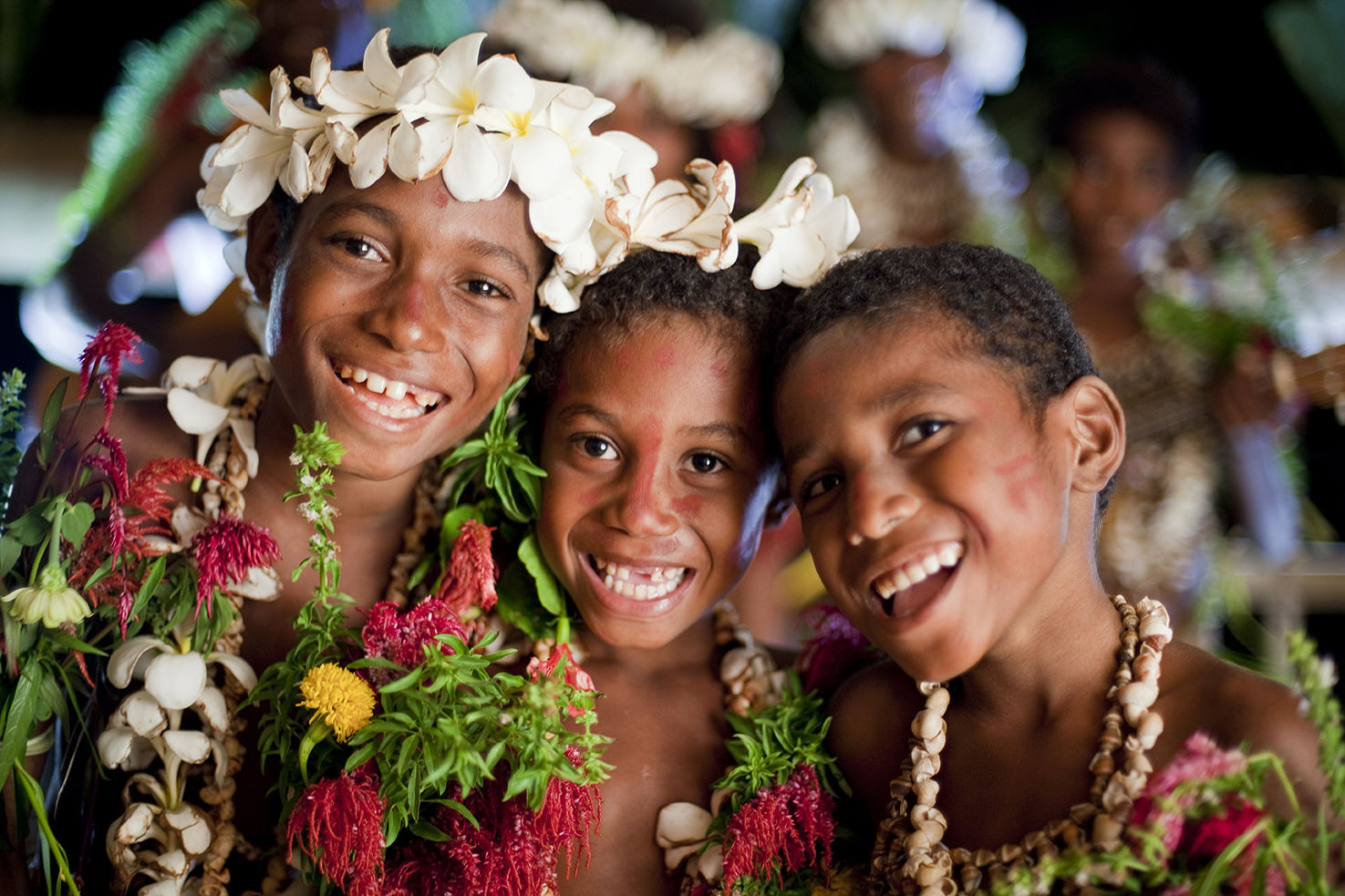
An Authentic Oasis of Tradition
In a world where shopping malls and smartphones seem ubiquitous, chances to experience authentic traditional cultures are rare. But not in Papua New Guinea, where footpaths still outnumber roads, virgin rainforests cover the mountains and much of the population maintains the lifestyles and beliefs of their ancestors. When you are greeted by a villager wearing a grass skirt and headdress, it's not a costume, it's way of life. You will be welcomed into villages that seem unchanged from centuries past, where the secrets of bush medicine and sorcery are preserved by storytellers, and meals come from backyard gardens and the surrounding forest, not the supermarket.
Highlights
- Best for: All travellers with a sense of adventure and love of nature and culture
- Best season to visit: Year round
- Weather: Tropical and moist, with minimal seasonal variation, and air temperatures from the high 70s to high 80s
PNG Information
Cultural activities in PNG Overview
Visits to traditional villages and other cultural sites most often begin with a short walk, a ride in a comfortable off-road or a boat trip, as there are few or no paved roads into the most remote areas of the country. Accommodations range from simple village guest homes to comfortable eco-lodges that blend off-grid sustainability with modern comforts.
Cultural activities in PNG Tips
Don't expect tour buses, brochures or gift shops. A visit to traditional villages puts you beyond the realm of mainstream tourism and into adventures that are safe but far less scripted than a theme park. A bit of time spent in advance learning about the culture and people will make for a more enjoyable and memorable visit.
Best Places for Cultural activities in PNG
From the fjords of McLaren Harbour, guests are ferried up a jungle river by outrigger canoe and welcomed at a traditional village where village elders share the ways of bush medicine, fire making and traditional tattooing. At the village of Orotoba, visitors can spend the night in thatch-roofed guest houses and share in traditional meals. A boat ride from a coastal lodge gives access to Sepik people, who are renowned weavers and wood carvers. In the Tari region, Huli Wigmen still stage sing-sings inspired by the mating rituals of flamboyant birds-of-paradise
What to Pack for Cultural activities in PNG
Sturdy walking shoes, light weight clothing that provides sun protection and cooling in lowland tropical conditions, and possibly a light jacket for mountainous regions. Cameras are acceptable.
Specials
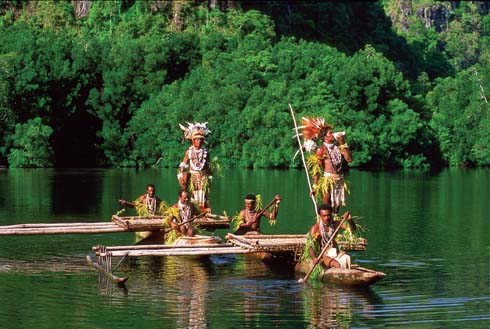
Tufi Dive Resort
Book on-line or Contact Caradonna Adventures at 800-330-6611 or email us sales@caradonna.com.
From $2,735 per person double diver
Book Now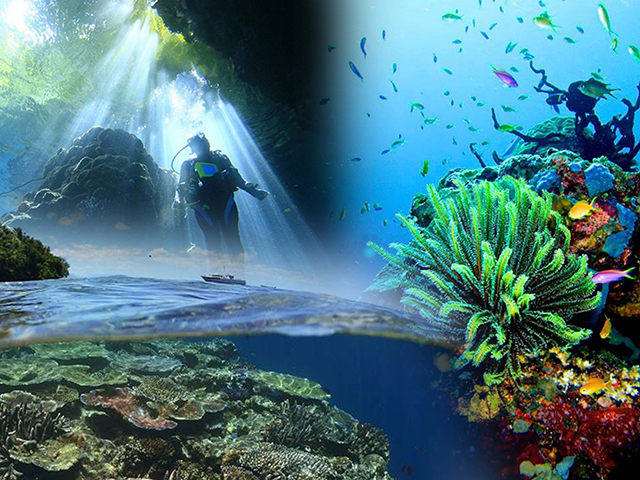
Papua New Guinea
Tawali Resort
Valid through 3/31/26. Rates from $2,675 per person double diver.
Valid 4/1/26- 3/31/27. Rates from $2,900 per person double diver.
Book on-line or Contact Caradonna Adventures at 800-330-6611 or email us sales@caradonna.com.
From $2,675 per person double diver
Book NowResorts

Papua New Guinea
Tufi Dive Resort
Nestled in the only fjord country, this boutique upmarket resort offers macro diving at its best along with great outer reef diving. Tufi Dive Resort also offers snorkeling, cultural trips, fishing, outrigger safaris, and trekking.
Book on-line or Contact Caradonna Adventures at 800-330-6611 or email us sales@caradonna.com.
See Packages & Learn More

Papua New Guinea
Tawali Resort
Tucked away, only accessible by boat, sits what may be Papua New Guinea's best kept scuba diving secret. Located on a volcanic bluff overlooking the clear protected waters of Milne Bay, Tawali offers travelers a unique location to dive, relax and enjoy the unspoiled wonders of this magnificent part of the world.
Book on-line or Contact Caradonna Adventures at 800-330-6611 or email us sales@caradonna.com.
See Packages & Learn More

Papua New Guinea
Walindi Plantation Resort
Located in Kimbe Bay, this resort has set the standard in catering to the diver who craves the very best. Stunning vistas above the water are surpassed by the profusion of corals and sheer abundance of marine life beneath the sun-drenched turquoise waters of Kimbe Bay.
Book on-line or Contact Caradonna Adventures at 800-330-6611 or email us sales@caradonna.com.
See Packages & Learn More
Liveaboards
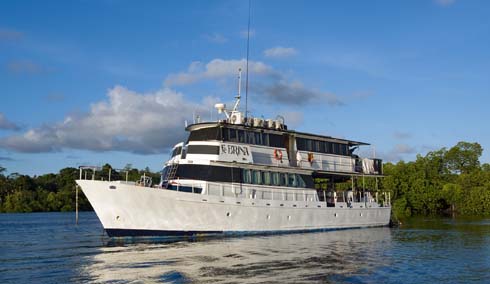
Papua New Guinea
MV FeBrina
Call 800-330-6611 for Special Pricing and Information.
See Packages & Learn More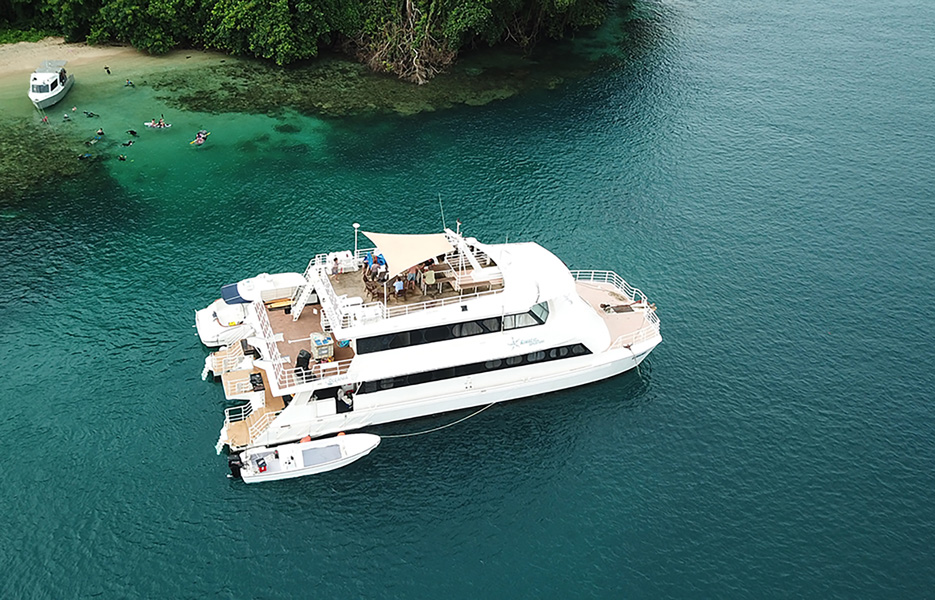
Papua New Guinea
MV Oceania
Call 800-330-6611 for Special Pricing and Information.
See Packages & Learn MorePassport and/or Visa Requirements
Entry Requirements: All U.S. citizens are required to present a valid passport which must be valid for at least 6 months beyond the date of entry into the country. Proof of onward or return ticket may be required and you must have at least 1 blank page in your passport for the entry stamp. Visas are required for entry for stays less than 60 days which are given upon arrival for tourist stays.
Exit Requirements: All persons leaving PNG, pay a Government Departure Tax which should be included in your airline ticket.
Immunizations
While there are no required vaccines for entry into Papua New Guinea, it is always recommended that you check with your doctor and the Centers for Disease Control on recommended vaccinations for travel at cdc.gov.
Culture and Customs
Papua New Guinea is one of the most fascinating and primeval destinations on earth. It is a land of smoldering volcanoes, impenetrable forests, exotic wildlife and still more exotic cultures. With few roads, vast tracts of the interior highlands remained unknown to the outside world until the mid 20th century. This region is home to isolated tribal communities that speak more than 800 distinct languages. Village elders are one generation away from a stone-age heritage, and much of the nation still embraces broad elements of traditional lifestyles and dress. Elaborate rituals accompany marriages, deaths, rites of passage and ceremonial eats. Cultural gatherings such as sing sings are not performed for tourists but are an actual gathering of tribes to resolve conflicts and disputes through competitive song and dance rather than warfare. In addition to unique cultural interactions that can include stays in traditional villages, visitors can engage in a range of eco adventures, from birding excursions to mountain treks and river trips in dugout canoes.
Electricity, Phone and Internet Access
Electricity in PNG is 240 volts, 50 Hz, similar to Australia, so an adapter will be needed for U.S. visitors. Some hotels have 110 adapters for hair dryers and shavers. The country code for PNG is 675. Check with your cell phone provider for international plans including data, text and voice. Some hotels offer WiFi, but internet service can be spotty.
Water Quality
In general, drinking the tap water is not recommended. It is best to drink bottled water throughout the country.
Language & Currency
English and Tok Pisin are the official languages, but most communication is via Tok Pisin. There are over 800 indigenous languages spoken among the various native tribes. The local currency is the Papua New Guinea Kina (PGK) but U.S. dollars are accepted in some places. Check the currency rate here. ATM cards can be used at banks. It is recommended to change some money in Port Moresby upon arrival if possible.
Time
Papua New Guinea utilizes Papua New Guinea Time or PGT which is 10 hours ahead of Greenwich Mean Time (+10 GMT). PNG does not observe Daylight Savings Time.
Location, Size and Population
Papua New Guinea is a large island located in the southwestern Pacific and accounts for the eastern half of New Guinea and it’s numerous other offshore islands. The island is located 160 kilometers north of Australia. There are some 600 offshore islands off of Papua New Guinea. The size of Papua New Guinea is approximately 178,000 square miles (about the size of California) with the main island having the bulk of the surface area. The island of New Britain is approximately 14,000 square miles.
The population of Papua New Guinea is 7.77 Million (2016).